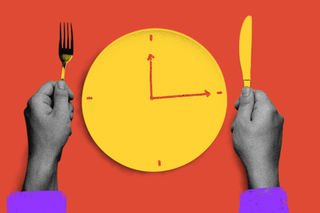
Is Intuitive Eating the Answer to Tackling Diet Culture?
Intuitive eating isn’t just about improving our relationship with food, but about learning to trust our bodies, too.

The practice of intuitive eating is dubbed as the counter to diet culture. Proponents of intuitive eating say it counters society’s obsession with having the perfect — in these instances, used interchangeably with “unrealistic” — physique. From intermittent fasting to keto and raw food diets to crash dieting — many of us have either participated in one diet fad or another, or know others who have. Intuitive eating starts from the premise that diet fads have misrepresented the relationship between weight and health. This is evident in how hitting weight loss targets through diets often comes at the cost of jeopardizing our health, be it physical or emotional. Centering weight in eating, however, erodes our trust in our own bodies.
“Most people have this desire to lose weight because it’s weaved into our culture to the point where if you’re not trying to lose weight, that’s seen as abnormal,” explains Rhonda Krick, a dietitian at Cedars-Sinai Medical Center in Los Angeles. “We’re all born with the ability to know when to eat and when to stop eating, and also know what is pleasurable and satisfying. However, most of us start to become more disconnected and less trusting of our own internal wisdom with the influence of family, friends, media, and diet culture.” That’s where intuitive eating prompts us to confront the problem with the diet mentality we’ve been forced to buy into.
At present, we’re almost at war with food — with millions of articles on the internet, guiding us matter-of-factly about foods that we must avoid at all costs on our pilgrimage to the perpetually-shifting goalpost of beauty. This is, in turn, equated with good health — but it’s a false premise to begin with. In truth, though, putting an end to this made-up war with nutrition and making peace with food is the way to pursue better health — only allergies or health conditions that render certain foods harmful are to be avoided.
In pursuance of better health — and thereby, freedom from our culture’s toxic relationship with food — intuitive eating endeavors to set us free from musings about whether we “deserve” the food we’re craving, if we’ll be able to “make up” for it by over-exercising or starving ourselves for the next meal, or whether consuming it will induce “guilt” and send us down a shame spiral. Intuitive eating alters the process of decision-making around food by replacing the diet mentality-inspired questions with these: Am I hungry? Do I want it? Is this the taste I’m craving and the quantity I feel my body needs?
“Intuitive eating is the polar opposite of dieting. Instead of following rules and restricting what you eat, you trust your internal hunger, fullness, and satiety cues to help you decide what and how much to eat,” notes Susan Albers, a psychologist. “We all have an internal eater in us, but it’s buried under diet culture. With dieting, you follow rules; with intuitive eating, you listen to your hunger cues… Hunger is not your enemy or something to be avoided.”
Related on The Swaddle:
For People With Poor Impulse Control, Instant Food Delivery Apps Can Kickstart Disordered Eating
However, as Albers admits, switching to intuitive eating isn’t the easiest, especially when the diet culture is omnipresent — being peddled by pop culture and social media, besides becoming entrenched into our language, too, through terms like “skinny jeans” and “sample size.” In the beginning, writer Ali Francis struggled to get into the habit of eating intuitively, too. “When I was hungry at noon despite having eaten breakfast at 10 a.m., I had to remind myself to honor that feeling and grab a bite. Diet culture wants us divorced from our bodies. Unlearning its messages — that the thin (white) ideal is a signal of virtue and success, that “junk food” is inherently immoral — takes time and constant vigilance,” Francis wrote.
Albers believes that detoxifying our relationship with food entails unlearning a lot and challenging our own thoughts around food. “[It] includes putting an end to language that indicates that you’re at war with food, like, ‘I can’t eat that,’ or ‘I shouldn’t have this’… These food rules aren’t laws, but they can feel very punitive if you don’t follow them. You have to ask: Why are you creating these food rules? And, importantly, are these rules helpful to you or not? Often, they’re unhelpful and arbitrary.”
Intuitive eating can improve our mental health, too, by addressing our food-related anxieties and promoting a better body image. Not only that, but for people recovering from certain eating disorders, practicing intuitive eating enabled them to develop better interoception — or the perception of sensations from inside the body, like thirst, hunger, or satiety, the sensation of breathing, feeling hot, cold, or itchy, or sensing one’s own heartbeat — which is a crucial skill for self‐management and self‐regulation even outside the domain of sustenance. “Not only did my anxiety disappear over deciding what to eat when everything was fair game… I treated my body like a friend, not a machine,” writes Francis.
Intuitive eating doesn’t help one lose weight, though. But then, again, no diet really does — at least, not in an enduringly healthy way. “The research is not promising for sustainable weight loss. We don’t have a method of weight loss that’s really sustainable for longer than two to five years. People might lose weight on diets initially, but then within no more than five years, they gain back their weight — and some go on to gain more weight,” says Krick, adding that dieting can, in fact, lead to weight gain. “Weight gain can be one of the side effects of dieting. Dieting can affect your metabolism, your ability to detect hunger and fullness.”
But despite the merits of intuitive eating, it’s not necessarily for everyone. To begin with, neurodivergent individuals who struggle with interoception and impulse control, or simply process the world differently, might not benefit from intuitive eating either — at least, not from the current framework of the method. In their attempts to read one’s body’s hunger cues, some people might begin overthinking and overanalyzing. It’s also easy for people to mistake a craving induced by a pizza ad on a billboard that they passed on their way back from work, as the body’s need for a pizza. Intuitive eating doesn’t forbid pizzas, though; one’s body might indeed want pizzas from time to time. But mistaking external cues for internal signals is the legacy that diet culture has left us with, making it harder to adopt the practice.
Related on The Swaddle:
What Happens to Our Bodies When We Eat All Our Meals in Front of the TV
Then, of course, there’s stress eating — or, “emotional eating” — which is easy to conflate with intuitive eating, as a result of people mistaking their emotional need for distraction with hunger. “Food and feelings are so intertwined with each other,” says Albers, adding that a “little bit of stress-eating now and then” isn’t such a big deal. “[W]hen we turn to food over and over again to soothe or comfort our feelings, it becomes a bigger issue… This principle is about finding kind ways to nurture, distract, comfort, and cope with your feelings with activities that help you to reduce your stress rather than with food,” Albers adds.
Marci Evans, a dietitian whom Francis spoke with, still encourages everyone, including neurodivergent individuals, to try it — especially if they’re able to access individualized support from an experienced intuitive eating counselor to help them tap into their bodies’ hunger signals better.
Experts have, however, criticized the intuitive eating movement being co-opted on social media by mostly thin, white, able-bodied, and usually, cis influencers. “Intuitive eating is weight-inclusive, and is for people of all body sizes. When people with thin privilege highlight their own bodies or continuously use their bodies in marketing, there’s a subtle — and even not so subtle, at times — suggestion that a peaceful relationship with food is only for those with bodily privilege,” says Kathleen Meehan, a dietitian and intuitive eating counselor. In other words, centering images of one’s own thin body to endorse intuitive eating, plays into diet culture. Further, a study showed that dieticians familiar with intuitive eating principles are still less likely to incorporate them into their recommended diets for people who are “overweight” by BMI standards.
Another trend that dieticians have observed among people wanting to practice intuitive eating, but not being sure how to start, is their reliance on influencers, who position themselves as experts on the subject, and yet, use terms like “portion control” and “intuitive fasting” — both of which, are antithetical to the core principles of intuitive eating. Gwyneth Paltrow, for instance, recently promoted a book about “intuitive fasting” — an approach that uses the language of intuitive eating to promote restrictive diet culture. And given how many eating disorders begin with restriction, this can be incredibly dangerous, points out Kim Daniels, a clinical psychologist and intuitive eating counselor. In addition, online trends like ‘What I Eat In a Day,’ which claim to promote intuitive eating but instead end up promoting restrictive diets and comparisons, also further the cycle of harm; what one influencer says they eat could look like very little, but when promoted as “healthy” or “intuitive,” it leads to others mimicking the same eating pattern, whether or not it works for them.
Just like Rome wasn’t built in a day, becoming an intuitive eater can take time, too. And that’s alright. Intuitive eating, after all, is about escaping the culture of following society’s rules in favor of what one’s body wants. And, sometimes, it just wants time. As Albers recommends, “Because of diet culture, jumping right into loving your body can be so difficult for people. Instead, it might be easier to start with accepting your body as it is — what it does for you, how it helps you.” Since intuitive eating isn’t just about improving our relationship with food, but with our bodies, too, that sounds like a healthy place to start.
Devrupa Rakshit is an Associate Editor at The Swaddle. She is a lawyer by education, a poet by accident, a painter by shaukh, and autistic by birth. You can find her on Instagram @devruparakshit.
Related


TMI: People Tell Us Their Unexpected Experiences With Contraceptives
